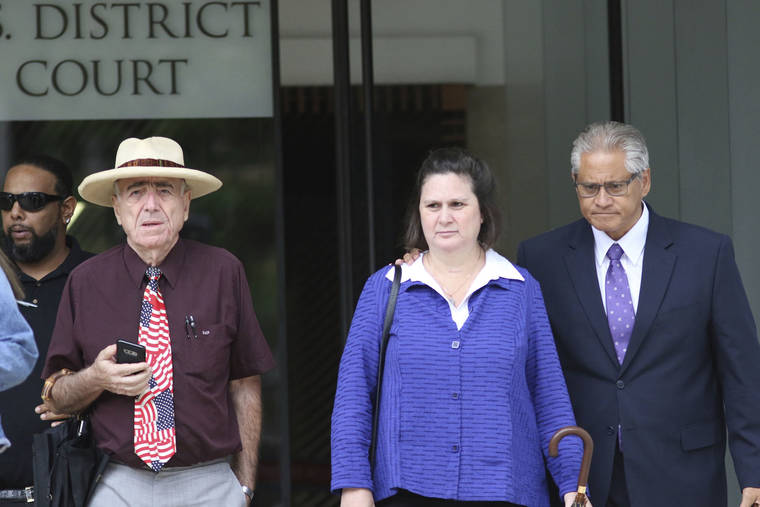HONOLULU — The former police chief of Honolulu and his wife, a former deputy prosecutor, abused their positions in an attempt to silence a relative who could have exposed the financial fraud that funded their lavish lifestyle, said a U.S. prosecutor Tuesday.
The contention came during closing arguments at the conspiracy trial of Louis and Katherine Kealoha, considered the largest public corruption case ever in Hawaii.
Joseph Orabona, a special U.S. prosecutor, said the defendants conspired to frame her uncle, Gerard Puana, for stealing their home mailbox as a way to discredit him in his lawsuit claiming Katherine Kealoha stole money from him and her grandmother.
Greed, manipulation and abuse of power were at the center of the conspiracy that consisted of obstruction, lies and depriving Puana of his civil rights, Orabona said.
He said 30 Honolulu police officers conducted 24-hour surveillance on Puana the week she claimed he stole her mailbox in 2013.
They were tailing Puana even before he was officially identified as a suspect, the prosecutor said.
“That’s abuse of power and corruption,” he said.
The case against the Kealohas is complicated and convoluted full of “unfulfilled promises” to the jurors about evidence showing there was a conspiracy, Katherine Kealoha’s attorney, Cynthia Kagiwada said in her closing argument.
For example, Kagiwada said, prosecutors told jurors about text messages and phone calls between the Kealohas and their co-defendants, who are current and former officers. “The government never showed you any content to those text messages and phone calls,” she said. “There’s absolutely no showing what these people were talking about.”
In Hawaii, people often have multiple relationships with each other, Kagiwada said.
Rustam Barbee, the attorney for Louis Kealoha, said the government’s conspiracy case is based on suspicion and speculation, and that his client wasn’t involved in his wife’s financial dispute with her uncle.
The mailbox framing is “far-fetched conspiracy theory,” and prosecutors have no evidence of this “imaginary frame job,” Barbee said in his closing arguments.
The allegations rocked Hawaii’s law enforcement community, where the power couple held sway at the highest levels: He as a hometown boy who made good as police chief, and she ascending to a powerful attorney’s position in the city prosecutor’s office.
Federal prosecutors say it was their lavish lifestyle that was their undoing as Katherine Kealoha cheated family and clients to pay for expensive cars, concert tickets, a pricey home and money spent on her firefighter boyfriend.
The defendants exercised their constitutional right not to testify during the trial.
Authorities say the Kealohas, with the help of a crew of hand-picked police officers under Louis Kealoha’s command, tried to frame Puana. The officers deny there was any conspiracy.
Puana has said Katherine Kealoha took out a reverse mortgage on the home owned by his mother, who is Katherine’s grandmother.
Katherine Kealoha used some of the funds as intended, to buy him a condo, but authorities said she drained about $150,000 in leftover funds in six months instead of paying off her grandmother’s reverse mortgage.
That led to a two-year federal investigation that prosecutors say unraveled her scheme to bilk relatives, banks and children whose trusts she controlled to maintain their lifestyle.
“You may not like everything you’ve heard about Katherine in this family dispute,” Kagiwada said, adding that it’s not part of the alleged conspiracy.
The Keolohas were indicted in 2017, and a judge split the case into two trials. The current case, which went to trial in May, focuses on the mailbox conspiracy. Two current police officers and one retired officer also face charges in the proceedings.
The second trial against the Kealohas will concentrate on bank fraud and identity theft charges.
Katherine Kealoha faces a third trial on allegations she and her brother, a pain physician, dealt opioids.
The once powerful couple has seen their political stock dwindle. She had to step down as a deputy prosecutor, and he retired with a $250,000 settlement package that he must repay if convicted of a felony.



